- Home
- Isaac Hooke
Just Another Day
Just Another Day Read online
Just Another Day
An ATLAS Story
by Isaac Hooke
Introduction
"Just Another Day" is an 8,500 word military science-fiction short story set in the ATLAS universe. "ATLAS" is a full-length military science-fiction novel that was released at the end of December 2013.
To be notified when my next novel comes out, click here to sign-up for my New Release mailing list. This list is only for new release announcements—no ads, no blog posts. You can unsubscribe at any time.
I hope you enjoy the story!
— Isaac Hooke
Just Another Day
Name's Facehopper. Well, that's my callsign really, but it might as well be my name. I've embraced it.
Killed with it.
I'm the Leading Petty Officer, or LPO, of Alfa Platoon, MOTH Team Seven. One of the most elite special forces units in the galaxy. MOTH stands for MObile Tactical Human. We're tacticians, corpsmen, snipers, astronauts and commandos rolled into one. Our specialty is what is known in military circles as DA, or direct action: we perform short-duration operations of surgical precision conducted in hostile, denied, or diplomatically sensitive environments. You want someone seized, recovered, or terminated quietly, and without stirring up a political shitstorm, you call us up.
Let me tell you about this one time when...
*
I was crouched in the cargo bay of a bulk carrier, in Tau Ceti system, deep in SK (Sino-Korean) territory. Aka enemy space: If we were caught, we'd be executed as spies. I suppose that's why I was dressed for a night on the town in my all-purpose combat jumpsuit.
For the past eight months the intelligence boys at the Special Collection Service had been tracking a high-payoff target, Mao Sing Ming, one of the most infamous privateers this side of the galaxy. Known as the Malefactor of the East, this guy captured passenger liners for salvage, killing off the entire crew complement for laughs. Anyway, a few weeks ago the military brass finally gave the go ahead to perform a surgical strike against him.
Special Warfare Command chose me and three others from Alfa Platoon to perform the "surgery." A fire team of four guys. Half a squad. Me, in command. Big Dog, my heavy gunner. Trace and Ghost, my two snipers.
The cargo hatch opened up into the void of space. The cargo bay had already been depressurized, so there was no explosive decompression or anything like that.
We still had the artificial gravity of the carrier to contend with, so the four of us walked calmly to the edge of the hatch.
The backdrop of stars stared back at me from the vacuum, spiraling, beckoning.
"Just another day in paradise," Big Dog sent over the comm.
"Thanks for the cliché, mate," I said.
"Anytime."
I could see our target, asteroid 99-Herculina, biggest asteroid in the Tau Ceti system, floating there in the vacuum. At its current distance, it was about the size of my thumbnail.
"Good luck, Facehopper," Chief Bourbonjack sent on the comm line. As my chief, Bourbonjack operated the platoon, while I ran it.
"Thanks, sir."
"Wish I was coming with you," Chief Bourbonjack sent. I could hear the jealousy in his voice.
"I know." He was a warrior, like the rest of the platoon. Everyone wanted to go. This was our job. This was what we trained to do. I almost pitied the Chief and the rest of the platoon.
Almost.
"Go go go!" Chief Bourbonjack sent.
I leaped forward through the opening and activated my jumpjets, thrusting out into the void.
I didn't have to look back to see if the rest of my fire team followed. I could see the green dots indicating their positions on the HUD (Heads-Up-Display) map overlaid in the top right of my vision. Like me, every member of the fire team wore standard MOTH jumpsuits. We didn't have any ATLAS mechs with us this time round: The mission profile specifically excluded them. Kind of too bad, actually. We were one of the few teams with the training and authorization to use them. Wrapped up inside an ATLAS mech, you were one sick killing machine.
"Gear launched," Chief Bourbonjack sent.
On the HUD map, I saw the dark red dot that indicated the gear payload slowly gaining on my group. With my jumpjets, I accelerated to match its speed, then navigated beside the payload, which was a metal box roughly the size of eight sniper rifles stacked together. I attached the payload buckle to my belt and wrapped an arm around the metal so that any course corrections I made would be transferred to the payload.
"Settle in, boys," I sent over the comm line. "We got a long wait ahead."
Ten hours, to be precise. The jumpjets carried a limited amount of fuel, so we used the jets solely to adjust our individual trajectories. Moving slowly also insured we wouldn't be picked up by the asteroid's LIDAR. Sure, Intel said the base lay on the far side of the rock, but that didn't mean the privateers hadn't setup LIDAR projectors all over the rock.
It took a lot of mental fortitude to be able to sit still for ten hours, babysitting the autopilot on your suit. Not everyone can do it. MOTH training weeds out those who don't have what it takes. It's one of the most brutal training regimens in the galaxy. Anyone who's ever experienced MOTH training will tell you that it changed their life. All I can say is I trusted the brothers in my platoon more than anyone else in the world. They were closer than even real brothers to me. I knew that every person on my fire team was fully alert and ready to respond to a threat at a moment's notice, ready to cover my back without question and to the best of his abilities. We relied on each other in the teams. Trusted each other absolutely. If one of my teammates told me he'd hold on to me when I was hanging from a cliff three thousand kilometers above the Earth, then I knew, without question, that there was no chance I'd fall.
If one of my teammates told me he'd watch my six while I explored a privateer base twelve lightyears from Earth, then I knew, without question, that there was no chance I'd be attacked from behind.
The asteroid grew bigger very very slowly. One hour became two, two four, four eight.
"Eightball has reached the surface," Big Dog sent. Eightball was the callsign we'd given the HS3 drone that had launched ahead of us. HS3 stood for Hover Squad Support System. HS3s were small, basketball-sized drones with 360 degrees of maneuverability. They had limited fuel, like our own jumpjets, but because of their small mass and the inverse magnetic field they generated, HS3s were able to levitate without any fuel expenditure—their jets were used mostly for directional changes. Nice, huh? Don't ask me to explain it any further than that though, as my understanding of the tech is a tad limited to say the least.
Big Dog was the drone operator for this mission, so he'd be receiving Eightball's telemetry. Did I say drone operator? Drone babysitter was a better term: Big Dog gave his instructions and the drone went on its merry way, doing much of the reconnaissance and scouting for us. Most of which we'd end up double-checking on our own anyway, but hey.
"Affirmative," I sent.
Another two hours to go.
Eventually the gray, crater-pocked surface filled my entire vision field.
"Passing through high-altitude missile engagement zone," Big Dog sent.
We all held our collective breaths. Now was the moment of truth. Had we come in too fast? Tripped one of the LIDAR detectors?
But the silence of the void continued. The crater-pocked gray surface continued to grow near, surprisingly fast now.
There was no attack.
We made it.
I applied reverse jets and used up half my fuel to slow the payload. We entered the dark side of the asteroid, and I activated my helmet lamp, setting it to the dimmest setting possible. Then I unbuckled myself from the metal box and let the payload slam into the surface below me. It
sent up a small cloud of dust. I cringed, hoping the tremors wouldn't be detected by the privateer base.
I landed gently, feet-first, beside the gear payload. I opened up the box and strapped on the weight attachments: four osmium clamps measuring a handspan in width and height and weighing five hundred pounds each (in Earth gravity). Of course, on this 0.025g asteroid those clamps weighed only twenty-one pounds each. By placing the weights on the designated area around my waist, I ensured that my center of mass was pretty close to what I was used to. Without those osmium clamps I'd basically reach escape velocity with every step I took. Not a good way to travel.
The others strapped on their own osmium attachments and gathered up the remaining gear. I grabbed an M4 rifle and clipped a loadout of grenades to my belt. The rifles came with an adjustable recoil buffer to dampen the effect of the kickback. I had mine currently dialed down to zero for obvious reasons, but depending on the tactical situation, a slight recoil could actually be good, especially when you were low on jumpjet fuel.
"Distance to the observation point?" I sent on the fire team channel.
"Approximately ten klicks, sir," Big Dog replied.
"Bounding overwatch formation." I split the fire team in half. Big Dog and I would proceed forward a hundred meters, then halt, taking cover. Then Ghost and Trace would "bound" past, stopping a hundred meters ahead of us and dropping. This would be repeated until we reached the observation point. Maybe I was being overly vigilant by assuming this formation, but I always did like to err on the side of caution.
So yeah.
Bounding overwatch.
Spacewalking was always kind of fun. It reminded me of jumping on rocks to cross a creek as a kid. You used this hop-step kind of walk, bouncing forward from one foot to the other, tilting your torso so that your center of mass stayed ahead of you, otherwise you ended up just hopping up and down. And just like crossing slippery rocks on a creek, it was all too easy to lose your footing and fall.
Ahead, the observation point was painted on my HUD, this flashing blue dot on the horizon that never seemed to get any bigger.
After about two hours advancing in the bounding overwatch formation, Big Dog sent an alert. "Eightball has reached the observation point five klicks from the base. Everything checks out so far. Looks like Intel actually lived up to its name this time."
"Good," I sent. "Maintain formation."
After a few minutes we passed into the light side of the asteroid, and deactivated our helmet lamps. I didn't feel any hotter—the suits were good at maintaining a constant temperature.
When we arrived at the observation point, we took cover in the craggy surface of the asteroid. I focused on the distant base on the horizon and activated the optical zoom in my facemask. Shiny, dome-like structures filled my vision. Each structure was connected by aluminum-can shaped passageways. According to the target information report, the skeletal frames of each module were made of titanium, while the outer shells were comprised of ten centimeter thick layers of Kevlar and other ceramic fabrics meant to absorb impacts from tiny meteors. These shells were coated with thermal blankets that deflected excessive solar radiation, which was why they appeared so shiny.
So, this was one of Mao Sing Ming's few known ports of calls. The SK government sanctioned these privateers. This base was in protected space. He'd never expect an attack here, in home territory. His guard would be down.
That was the theory anyway. Why then did the drone detect cameras setup all over the base, along with laser tripwires? That's something military intelligence had neglected to pass our way. We couldn't get much closer, not without setting off an alarm. Nor could the HS3 drone, which hovered nearby.
"Do we have confirmation on the HPT?" I sent. HPT stood for high-payoff target.
"HPT is en route, but hasn't arrived yet," Trace sent. In addition to sniper, he was also our communicator this time round, and carried all our communications equipment in a rucksack strapped on above his jetpack.
"All right. Comm silence. Gonna be a while."
Communications sent to HQ were designed to look like background radiation. But if you sent too many messages back at once from the same place, it became obvious that something more was going on.
I settled in, because now the real waiting began. We couldn't do anything until the target arrived.
We took turns at watch, two of us observing the base while the other two slept. The jumpsuits took care of our external bodily functions, flushing waste products into space. Retractable feed straws let us drink liquid meal replacements when we got hungry. Not the tastiest food, but it did what it was supposed to do.
The third morning found me re-watching Star Wars XXVII on my HUD. I was just at the point where Jabba's son begins the lightsaber dual with Yoda's son when Big Dog interrupted me.
"Incoming shuttle," Big Dog said into the comm line.
I shutdown the vid and zoomed in on the shuttle that was highlighted in dark red on my HUD. Definitely of SK make, judging from the hard angles. It was basically an iridium pod with two parabolic fins on either side and a stabilizer fin on top, with three thrust nozzles at the rear. Its nose was tilted up, and the landing gears had been lowered. I couldn't make out the cockpit windows from this angle.
"Still no sign of the mothership," Big Dog said.
"Oh it's there, don't you worry, mate," I said. A shuttle like that wasn't designed for interplanetary travel.
"Give me the word, sir." Big Dog had a Carl Gustav rocket launcher resting on his shoulder and aimed up at the object.
Trace and Ghost were awake now too, following the shuttle with their sniper rifles.
I zoomed in further. "There's no sign whatsoever that this shuttle houses the HPT. No external markings or labels of any kind. The serial number has been scraped off. And I can't see the cockpit windows."
Big Dog hadn't lowered the Carl Gustav. "Sir?"
"Bloody hell." I sighed. "Lower the rocket, Big Dog. We're going to have to do this the hard way." I wasn't going to risk destroying a shuttle when I couldn't make a positive id on the target.
I watched the shuttle dock inside the largest module of the base, a sprawling dome which was apparently the hangar bay. The hatch doors sealed shut, hiding the shuttle from view.
"Time for plan B." I gave my rifle to Big Dog and stripped off my utility belt, grenades and all.
Ghost handed me the holo projection attachment, and I applied it to my facemask. Ghost made some adjustments.
I watched his face as he worked, and studied those eerie red eyes of his, eyes that stood out all the more because of the paleness of his face. Ghost quite literally towered over me, and when you took him out of that jumpsuit he made quite the sight: a tall, lean albino with white hair and demonic eyes who could have been some alien warrior straight out of a science fiction novel. He was human, though. Like the rest of us. Humanity hadn't discovered any alien races yet. Not for want of trying.
"You make one mean-ass Italian," Ghost said. "Straight out of the slums. Or maybe the vineyard."
I couldn't see the holo projection at all from this side of the facemask, but I trusted him implicitly of course. If Ghost said I now looked like a mean-ass Italian, then I did.
"Is that a good idea?" I said. "The meanness? I'm supposed to be a merchant, after all."
"Hmm, good point." Ghost made some further adjustments. "There. Now you look like a doe-eyed wine merchant who has lost his way and just wants to go home to la mamma. All innocent looking. A lion in sheep's clothing."
I shrugged. "Works for me."
I needed the holo projection, at least to get in, because it was believed the SK spies maintained a database of all special forces operators by headshot. A few pencil-pushing moles back at HQ had been caught and executed over the years, but for every mole the brass tracked down a new one popped up: greed was too great a motivator.
One thing I should mention. Every man, woman and child had a chip embedded in the wrist, called an embedded Id
, that linked to everything from that person's public InterGalNet profile to his or her bank account. The Id chips of my fire team members had been backed up and wiped, so that our true identities couldn't be read.
But now Ghost uploaded the profile of a Franco-Italian merchant into my embedded Id, and when that was done he modified the digital signature of the Id to conform with Franco-Italian tech standards.
"You're now Mario Costa," Ghost sent. "Born during the Great Unification, purveyor of Lambrusco wine. Don't let your grape brothers down."
Ready to go, I turned toward the privateer base. "You can bet I won't."
"I still think this is a bad idea," Big Dog said.
"You think every idea that doesn't involve blowing something up right away is bad."
Big Dog scowled. "Yeah, but this is especially bad. Because it involves us staying behind while you go in alone."
"You're just mad because I get to have all the fun."
"Yeah," Big Dog smiled. "There is that. But I'm also seriously concerned about your refined English ass. Sir."
"Okay. Worry noted, mate."
Big Dog stared at the distant base. "What if the HPT isn't even there?"
"Let me worry about that. You remember how I got my callsign, don't you?"
Big Dog nodded. "How could I forget?"
He'd been there from the start, when I was still a "caterpillar without a callsign" on my first mission. It was an Earth-based raid, in the mountainous war zone between Mongolia and Russia. My platoon was working with the Marines, performing counterinsurgency operations. We usually went ahead of their advance, scouting for pockets of resistance and securing buildings along the way.
I'd gone into this one particular building first. Big Dog and the other members of my fire team followed me in. Gunfire erupted from upstairs. I dove to the deck and fired off five shots at the second story from my M4 rifle. With each shot, I literally hopped my aim from face to face. I scored five headshots in five seconds, ending the engagement.
The biggest debate after that gun fight was whether to call me Five-in-five, or Facehopper. The latter ended up winning the majority vote.

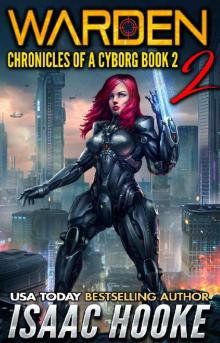 Warden 2
Warden 2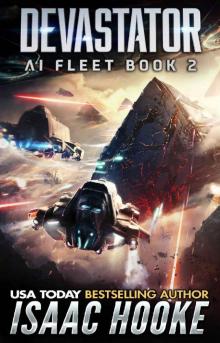 Devastator
Devastator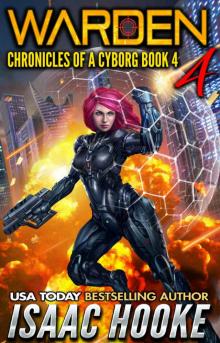 Warden 4
Warden 4 Emperor
Emperor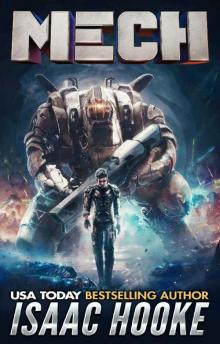 Mech
Mech Conqueror
Conqueror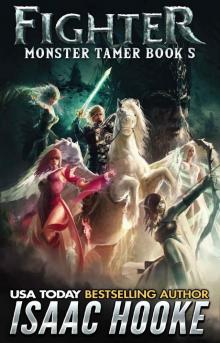 Fighter
Fighter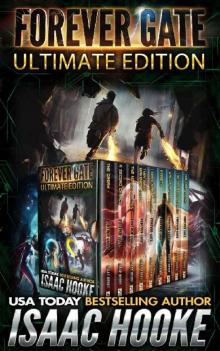 The Forever Gate Ultimate Edition
The Forever Gate Ultimate Edition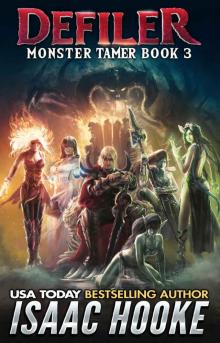 Defiler
Defiler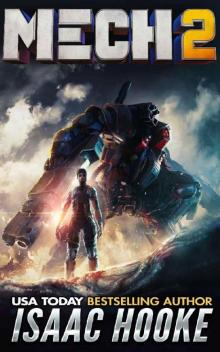 Mech 2
Mech 2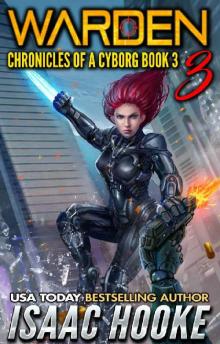 Warden 3
Warden 3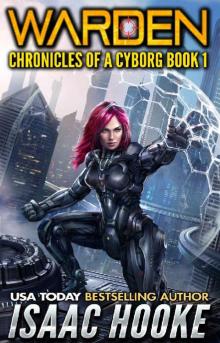 Warden 1
Warden 1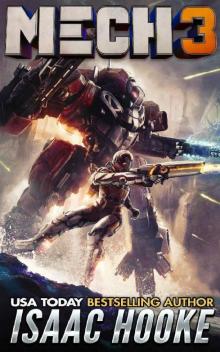 Mech 3
Mech 3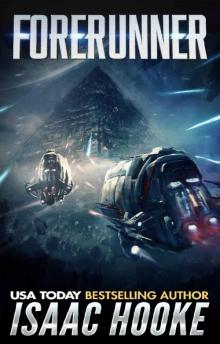 Forerunner
Forerunner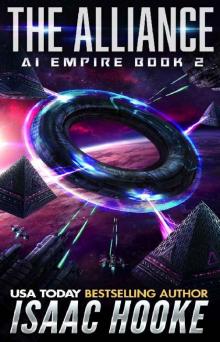 The Alliance (AI Empire Book 2)
The Alliance (AI Empire Book 2)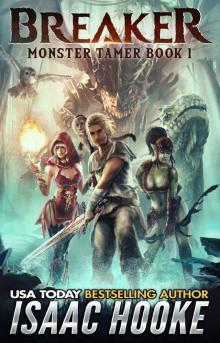 Breaker (Monster Tamer Book 1)
Breaker (Monster Tamer Book 1)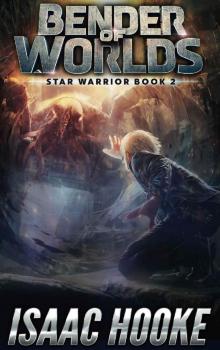 Bender of Worlds
Bender of Worlds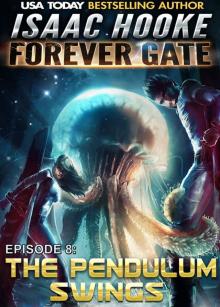 The Pendulum Swings (The Forever Gate Book 8)
The Pendulum Swings (The Forever Gate Book 8)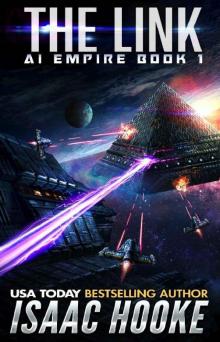 The Link
The Link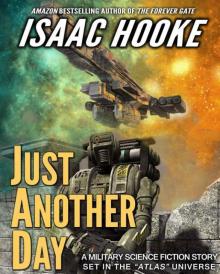 Just Another Day
Just Another Day Star Warrior
Star Warrior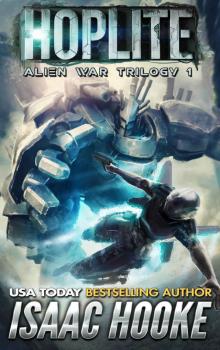 Alien War Trilogy 1: Hoplite
Alien War Trilogy 1: Hoplite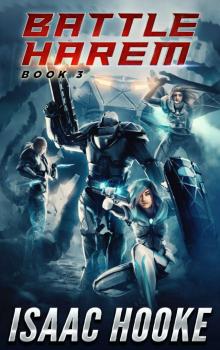 Battle Harem 3
Battle Harem 3 The Ethan Galaal Series: Books 1 - 3
The Ethan Galaal Series: Books 1 - 3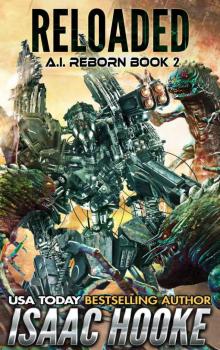 Reloaded
Reloaded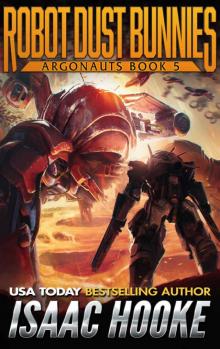 Robot Dust Bunnies (Argonauts Book 5)
Robot Dust Bunnies (Argonauts Book 5) Battle Harem
Battle Harem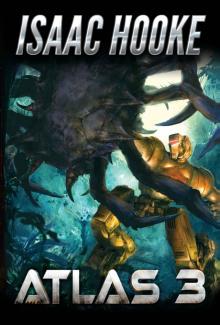 ATLAS 3 (ATLAS Series Book 3)
ATLAS 3 (ATLAS Series Book 3)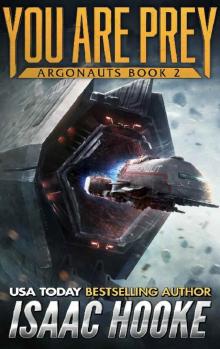 Argonauts 2: You Are Prey
Argonauts 2: You Are Prey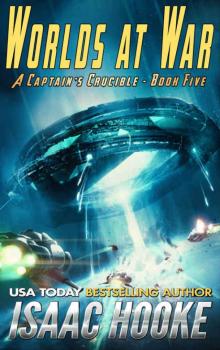 Worlds at War (A Captain's Crucible Book 5)
Worlds at War (A Captain's Crucible Book 5)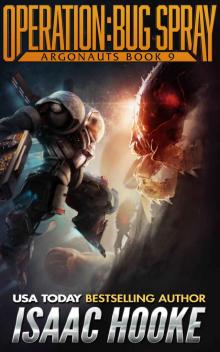 Operation: Bug Spray (Argonauts Book 9)
Operation: Bug Spray (Argonauts Book 9)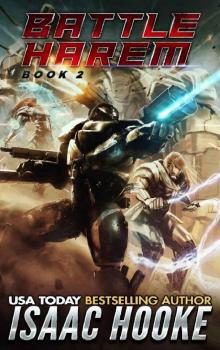 Battle Harem 2
Battle Harem 2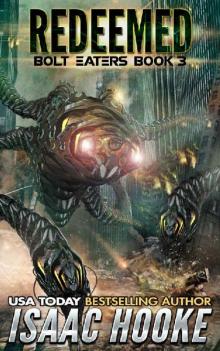 Redeemed (Bolt Eaters Trilogy Book 3)
Redeemed (Bolt Eaters Trilogy Book 3)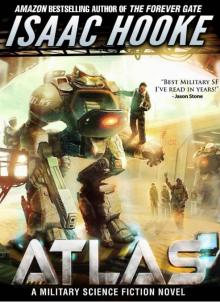 Atlas
Atlas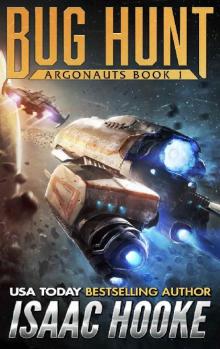 Argonauts 1: Bug Hunt
Argonauts 1: Bug Hunt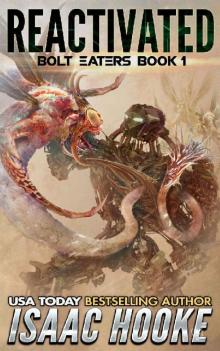 Reactivated (Bolt Eaters Trilogy Book 1)
Reactivated (Bolt Eaters Trilogy Book 1)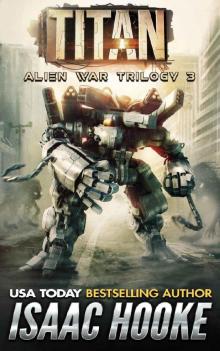 Alien War Trilogy 3: Titan
Alien War Trilogy 3: Titan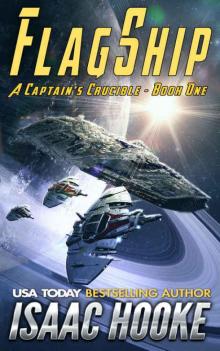 Flagship (A Captain's Crucible #1)
Flagship (A Captain's Crucible #1)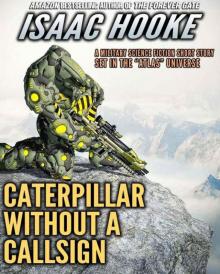 Caterpillar Without A Callsign
Caterpillar Without A Callsign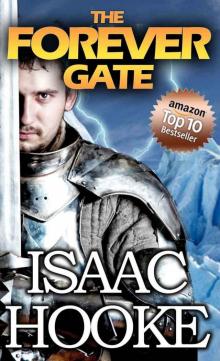 The Forever Gate
The Forever Gate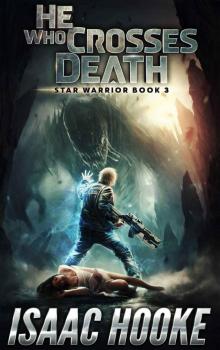 He Who Crosses Death (Star Warrior Quadrilogy Book 3)
He Who Crosses Death (Star Warrior Quadrilogy Book 3)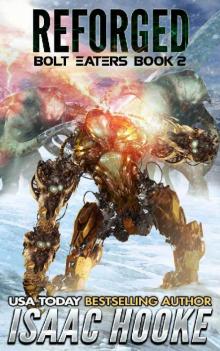 Reforged (Bolt Eaters Trilogy Book 2)
Reforged (Bolt Eaters Trilogy Book 2)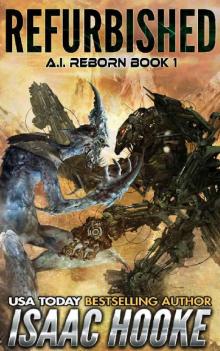 Refurbished
Refurbished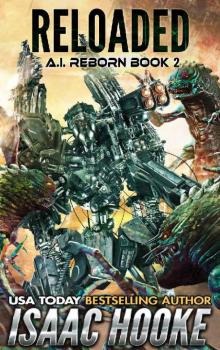 Reloaded (AI Reborn Trilogy Book 2)
Reloaded (AI Reborn Trilogy Book 2)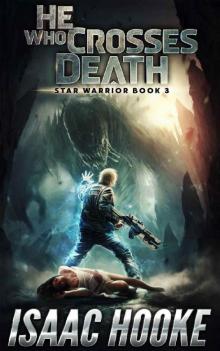 He Who Crosses Death
He Who Crosses Death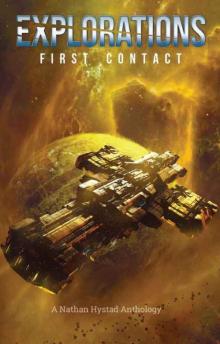 Explorations: First Contact
Explorations: First Contact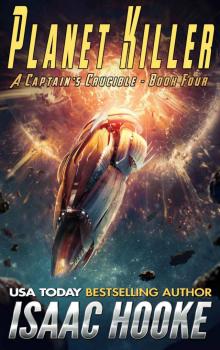 Planet Killer (A Captain's Crucible Book 4)
Planet Killer (A Captain's Crucible Book 4)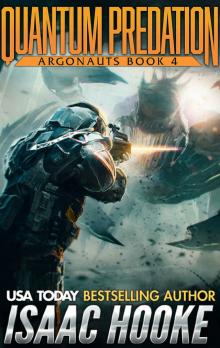 Quantum Predation (Argonauts Book 4)
Quantum Predation (Argonauts Book 4)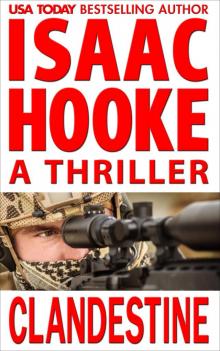 Clandestine-IsaacHooke-FreeFollowup
Clandestine-IsaacHooke-FreeFollowup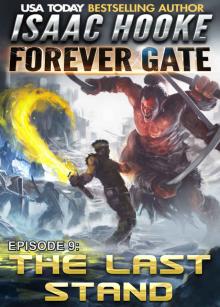 The Last Stand (The Forever Gate Book 9)
The Last Stand (The Forever Gate Book 9)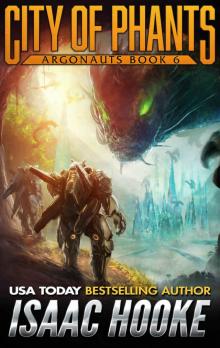 City of Phants (Argonauts Book 6)
City of Phants (Argonauts Book 6)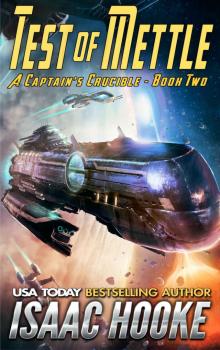 Test of Mettle (A Captain's Crucible Book 2)
Test of Mettle (A Captain's Crucible Book 2)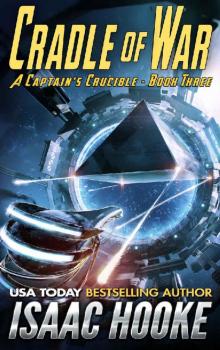 Cradle of War (A Captain's Crucible Book 3)
Cradle of War (A Captain's Crucible Book 3)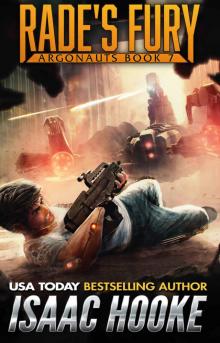 Rade's Fury (Argonauts Book 7)
Rade's Fury (Argonauts Book 7)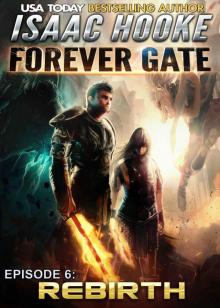 Rebirth (The Forever Gate Book 6)
Rebirth (The Forever Gate Book 6)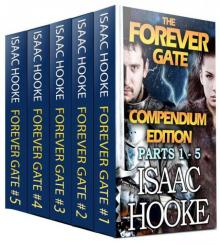 The Forever Gate Compendium Edition
The Forever Gate Compendium Edition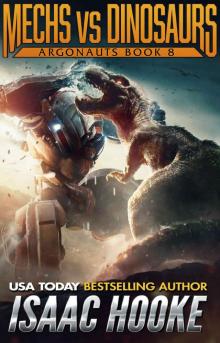 Mechs vs. Dinosaurs (Argonauts Book 8)
Mechs vs. Dinosaurs (Argonauts Book 8)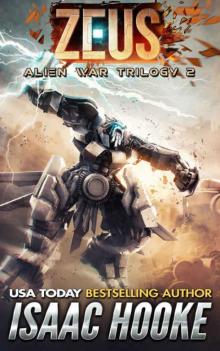 Alien War Trilogy 2: Zeus
Alien War Trilogy 2: Zeus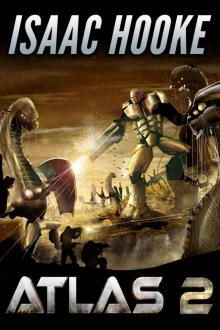 ATLAS 2 (ATLAS Series Book 2)
ATLAS 2 (ATLAS Series Book 2)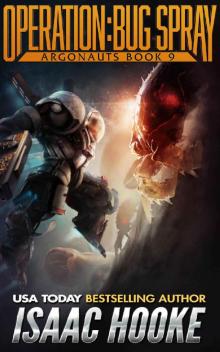 Operation_Bug Spray
Operation_Bug Spray